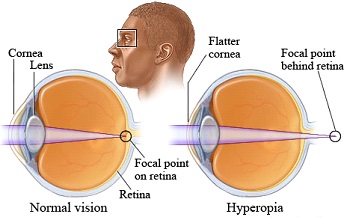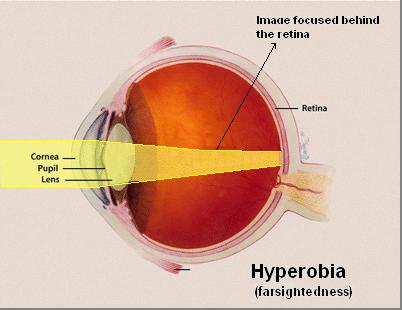
Farsightedness is an eye condition characterized by a weak focus of light rays. The lens, which is the transparent outer layer of the eye, focuses images onto the retina, a part of the eye that processes visual information. Because of this weak focus, a person who is farsighted has blurred or distorted vision. This condition usually runs in families and most children grow out of it. In some cases, patients may experience headaches when trying to focus on near objects.
In a thorough eye examination, your doctor can rule out any eye disorders, including farsightedness. A slit-lamp examination can also help determine the degree of your farsightedness. This procedure involves a detailed assessment of the eye’s structure. A farsighted person will have problems with both distance and close vision, causing blurred images. This condition can also cause itchy or burning eyes. A simple eye exam can determine the severity of the condition, which can be treated with glasses, contact lenses, or even surgery. The correct treatment depends on how severe your condition is. For example, some people only require glasses when they are working closely, while others will need them for other tasks.
While farsightedness is hereditary, some individuals may develop it due to rare eye diseases. This type of vision problem usually starts in childhood and corrects itself with normal eye growth. However, it is possible for a child to become farsighted as a teenager and still accommodate it by the time he is nine years old. It is best to seek the advice of a qualified ophthalmologist as soon as possible.
For more information about this condition, visit your doctor’s website Bintang Lestari. A healthcare professional can evaluate you for early symptoms of long-term or short-term eye disease. A comprehensive eye exam can also prevent further problems from occurring. If you have blurry vision, you may need treatment. A qualified ophthalmologist can provide you with this information. If your vision is blurry, your doctor will prescribe glasses or contact lenses.

Depending on the severity of your condition, an experienced doctor may recommend surgery or prescribe eye drops. Some patients are too farsighted to wear contact lenses, and this can cause various vision problems. In some cases a prescription may be required. You may need more than one solution. If you can’t find a solution from your doctor, you can search for one online. Using a trusted eye doctor is the best way to find the best treatment for your condition.
Although farsightedness is not hereditary, some people may have this eye disease. A complete eye examination will reveal the exact causes of the disease. As a rule, this is a type of normal vision. In some cases, the condition worsens with age, but it is still a serious problem. Your doctor can correct your farsightedness with glasses, contact lenses, or surgery. If you are nearsighted, you will need glasses, but this will not affect your ability to read close objects.
During an eye exam, your doctor will determine the causes of your farsightedness. Your condition may be caused by a short eye, exposure to a powerful laser, or a corneal disorder. A comprehensive eye examination will determine the exact cause of your condition. During your examination, your doctor will determine which treatment options are best for you. The best vision solution will depend on your specific circumstances. In some cases, surgery will not be necessary.
A full eye exam will determine your vision and the extent of your farsightedness. Moreover, a doctor will assess your overall eye health and make sure you get a regular eye exam. This will be necessary to monitor your vision and prevent complications. Obtaining a prescription for glasses is essential for your eyes and can increase your confidence and self-esteem. If you are farsighted, you may want to consult a specialist and discuss your options.
In addition to your eye health, you can improve your vision with the use of prescription glasses. If your eyes are too far-sighted, you might experience headaches and aching eyes. You may need to wear glasses when reading or doing close-up work. Your prescription number should be higher than the one you are currently wearing. If you need to wear glasses or contacts, your doctor will prescribe contact lenses or glasses. For severe cases, surgery may be the best option.